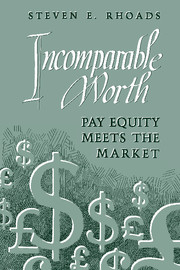Book contents
- Frontmatter
- Contents
- Acknowledgments
- 1 Introduction
- 2 The debate over equal pay for comparable worth
- 3 Implementing comparable worth in Minnesota
- 4 Job evaluation in Minnesota localities
- 5 Equal pay for work of equal value in the European Community
- 6 Equal pay for work of equal value in the United Kingdom
- 7 Equal pay for work of equal value in Australia
- 8 Conclusion
- Appendix: a note on the research and presentation of findings
- Notes
- Index
8 - Conclusion
Published online by Cambridge University Press: 06 July 2010
- Frontmatter
- Contents
- Acknowledgments
- 1 Introduction
- 2 The debate over equal pay for comparable worth
- 3 Implementing comparable worth in Minnesota
- 4 Job evaluation in Minnesota localities
- 5 Equal pay for work of equal value in the European Community
- 6 Equal pay for work of equal value in the United Kingdom
- 7 Equal pay for work of equal value in Australia
- 8 Conclusion
- Appendix: a note on the research and presentation of findings
- Notes
- Index
Summary
The main source of support for the comparable-worth movement is the reported wage gap, which proponents see as largely the product of sex discrimination. Chapter 2 explained that empirical studies have reached widely varying conclusions on the importance of discrimination as an explanation for the pay gap. Many opponents of comparable worth think that differences between the sexes in human capital and in the importance the sexes attribute to varying job characteristics explain much more about the wage gap and occupational sex segregation than does discrimination. For example, as explained in Chapter 2, on the average, women have stronger preferences than men for jobs with shorter commutes, more flexible scheduling, and good working conditions, and they more often than men work in jobs with these desired characteristics. Such characteristics can be considered a form of nonmonetary income, and their disproportionate availability in predominantly female jobs means that monetary estimates of the wage gap overstate differences in total compensation for work. In any case opponents believe that even substantial marketplace discrimination need not have a significant effect on the wage gap because of competition for labor among nondiscriminatory firms.
For their part, comparable-worth proponents argue that even supposedly nondiscriminatory factors such as human capital or family responsibilities are themselves tinged with discrimination. Some of this discrimination results from societal forces. Families and schools may raise young women to believe that they are odd if they want to work in scientific fields or in dirty, risky, predominantly male jobs or if they want to devote more energy to their careers than to their families. But proponents believe that much of the discrimination is the fault of employers.
- Type
- Chapter
- Information
- Incomparable WorthPay Equity Meets the Market, pp. 218 - 246Publisher: Cambridge University PressPrint publication year: 1993

